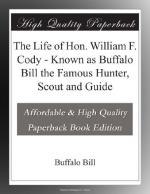When we had traveled about two miles we saw the smoke arising from our old camp. The Mormons after taking what goods they wanted and could carry off, had set fire to the wagons, many of which were loaded with bacon, lard, hard-tack, and other provisions, which made a very hot, fierce fire, and the smoke to roll up in dense clouds. Some of the wagons were loaded with ammunition, and it was not long before loud explosions followed in rapid succession. We waited and witnessed the burning of the train, and then pushed on to Fort Bridger. Arriving at this post, we learned that two other trains had been captured and destroyed in the same way, by the Mormons. This made seventy-five wagon loads, or 450,000 pounds of supplies, mostly provisions, which never reached General Johnson’s command, to which they had been consigned.
CHAPTER VI.
HARD TIMES.
As it was getting very late in the fall, we were compelled to winter at Fort Bridger; and a long, tedious winter it was. There were a great many troops there, and about four hundred of Russell, Majors & Waddell’s employees. These men were all organized into militia companies, which were officered by the wagon-masters. Some lived in tents, others in cabins. It was known that our supplies would run short during the winter, and so all the men at the post were put on three-quarter rations to begin with; before long they were reduced to one-half rations, and finally to one-quarter rations. We were forced to kill our poor worn-out cattle for beef. They were actually so poor that we had to prop them up to shoot them down. At last we fell back on the mules, which were killed and served up in good style. Many a poor, unsuspecting government mule passed in his chips that winter in order to keep the soldiers and bull-whackers from starvation.
It was really a serious state of affairs. The wood for the post was obtained from the mountains, but having no longer any cattle or mules to transport it, the men were obliged to haul it themselves. Long lariats were tied to the wagons, and twenty men manning each, they were pulled to and from the mountains. Notwithstanding all these hardships, the men seemed to be contented and to enjoy themselves.
The winter finally passed away, and early in the spring, as soon as we could travel, the civil employees of the government, with the teamsters and freighters, started for the Missouri river; the Johnson expedition having been abandoned. On the way down we stopped at Fort Laramie, and there met a supply train bound westward. Of course we all had a square meal once more, consisting of hard tack, bacon, coffee and beans. I can honestly say that I thought it was the best meal I had ever eaten; at least I relished it more than any other, and I think the rest of the party did the same.




